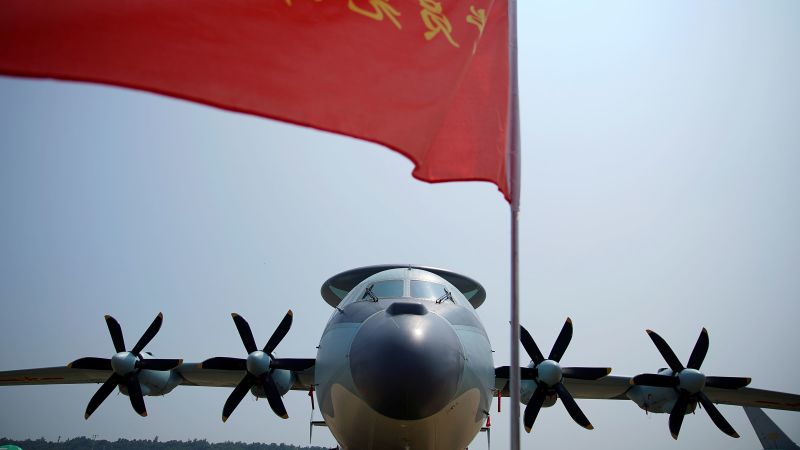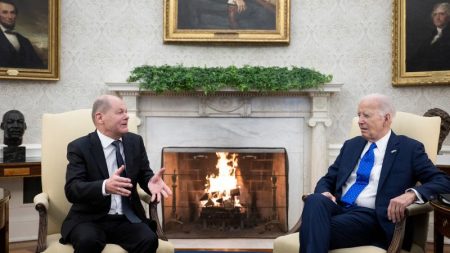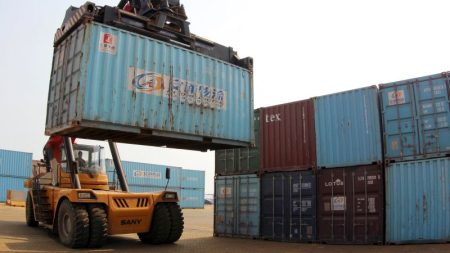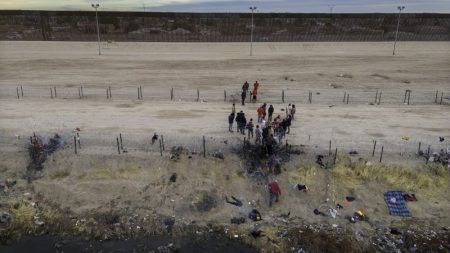The US and its closest intelligence partners are warning that China has intensified a campaign to recruit former Western military pilots and other service members to train its own aviators, according to a joint bulletin released by the nations on Wednesday.
Beijing has for years struggled with its air operations — including both pilot proficiency and its technical capabilities to counter western aviation tactics — even as it has built up its air and naval forces in preparation for a possible military takeover of the island of Taiwan.
Western-trained pilots can teach Chinese military personnel everything from air combat tactics to how to land on an aircraft carrier, according to a US official. They can also give China a precious window into how it can counter western combat tactics.
The warning was issued by the so-called Five Eyes nations, which share higher-level intelligence among them: the US, the UK, Canada, Australia and New Zealand.
“To overcome their shortcomings, China’s People’s Liberation Army has been aggressively recruiting Western military talent to train their aviators,” said Michael Casey, the director of the National Counterintelligence and Security Center, part of the US intelligence community. “Recent actions by Western governments have impacted these operations, but PLA recruitment efforts continue to evolve in response.”
The bulletin, released by the Office of the Director for National Intelligence, warns that Beijing has used private companies that often hide their ties to the Chinese military to attract western pilots, contacting them via headhunters or professional networking sites and offering “lucrative contracts and the opportunity to fly exotic aircraft.” Military pilots, flight engineers, and air operations center personnel, as well as “technical experts with insight into Western military tactics,” it said, have been “the most sought-after targets.”
These private companies have set up notionally independent operations in third countries like South Africa, Singapore and Laos, according to the US official. Former western pilots — which number at least in the dozens — are training Chinese military officials who then return to China and, in turn, train more pilots there, this person said.
The US has sought to crack down on the tactic, in part by sanctioning some of the third-party companies. But China has adapted, according to intelligence officials.
“There have been efforts to incorporate entities in different locations under different names,” said an NCSC official. “There have also been variations in recruitment pitches and approaches.”
The bulletin caps years of growing concern by the US and its allies that the PLA was seeking to gain insight into western military tactics and technology by recruiting its former pilots.
It also comes as tensions have continued to grow between China and Taiwan, just weeks after China launched large-scale military drills surrounding the island in what it said was punishment for “separatist acts” after Taiwan elected a new president.
Adm. John Aquilino, the former head of US Indo-Pacific Command, told Congress in March that combined, the PLA Navy and PLA Air Force “constitute the largest aviation force in the Indo-Pacific.”
In September, Gen. Charles Q. Brown — then the Air Force chief of staff and now the chairman of the joint chiefs of staff — warned in a letter to the Air Force that foreign companies were “targeting and recruiting US and NATO-training military talent” to assist the People’s Liberation Army.
“By essentially training the trainer, many of those who accept contracts with these foreign companies are eroding our national security, putting the very safety of their fellow servicemembers and the country at risk, and may be violating the law,” Brown said. “Just as I am asking for your help, I have also asked for help from our allied Air Chiefs to address the same issue within their ranks.
In January of this year, US and NATO officials held a conference focused on countering Chinese recruitment of allied personnel to enhance their own air operations.
The issue burst into the public consciousness in October of 2022, when former US Marine fighter jet pilot Daniel Duggan was arrested in Australia for allegedly training PLA pilots how to land on aircraft carriers.
He has been held in a maximum-security prison in Australia since 2022, CNN has previously reported, after he worked in Beijing for six years. An indictment in 2017 alleged that Duggan trained Chinese pilots while he was still a US citizen, between November 2009 and November 2012.
Duggan, now a naturalized Australian citizen, has denied the allegations that he broke US arms control laws.
That same month, the UK Ministry of Defense issued a security alert after several of its military pilots were also found to have been training the PLA Air Force. The pilots had been contracted through a private South African company that offered high salaries. Canada and Australia announced investigations into the practice that same year.
The US is seeking Duggan’s extradition and is awaiting a final decision from the Australian Attorney General. The Arms Export Control Act, which bans weapons sales, also prohibits the training of foreign military personnel without explicit authorization.
The bulletin on Wednesday also comes after multiple US service members have been arrested for allegedly leaking classified intelligence to China. In March, a US Army sergeant was charged with allegedly leaking classified information about advanced US weapons in exchange for $42,000.
Last August, two US Navy sailors were arrested for allegedly sending sensitive military information to Chinese intelligence officers.
Matt Olson, the Justice Department’s assistant attorney general for national security, said in a press conference at the time that the charges against the two sailors “demonstrate the (People’s Republic of China’s) determination to obtain information that is critical to our national defense by any means, so it can be used to their advantage.”
Read the full article here













